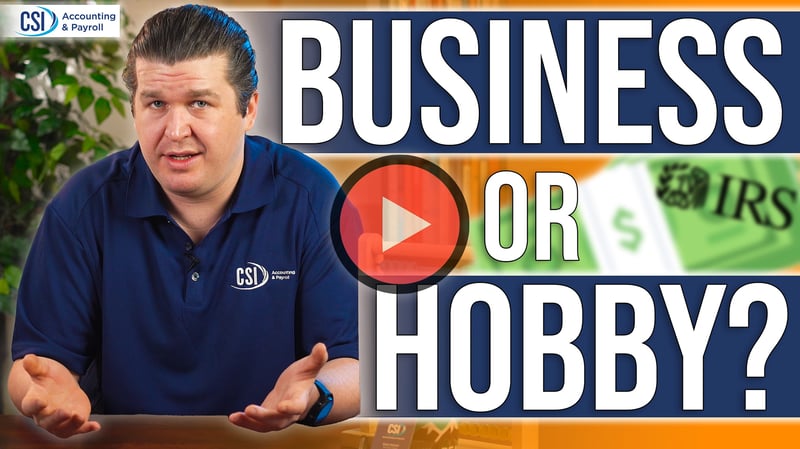When Does a Hobby Become a Business?
March 11th, 2024 | 5 min. read

If you started with an interest and turned it into a hobby, that’s awesome! But how can you tell when your hobby becomes a business? You need to know for tax purposes.
At CSI Accounting & Payroll, we’ve worked with small businesses for over 50 years. We know that if a prospect comes to us seeking accounting for a hobby, they wouldn’t be getting the right value from our service.
While there are no formal requirements that you must meet to be a business, there are indicators that can add up. Just keep in mind that the IRS gets the final say if they don’t feel like you’re a business.
So, how do you know if your passion is a business or a hobby?
Small Business vs Hobby Indicators
The IRS offers a short list of questions to ask yourself and decide whether your passion is a hobby or a small business. However, we want to explain them a bit more for a deep dive.
Do you carry out the activity in a businesslike manner and keep complete and accurate books and records?
This could mean you have a business bank account instead of just using your personal bank account. It also means you track business receipts and make an effort to handle finances as if the business depends on it.
Does the time and effort you put into the activity show you intend to make a profit?
Do you treat it as your job and a way to make money? Do you spend a lot of time on it, or is it a weekend gig outside of your day job?
After two or three years of operations, you should be able to tell if you’re dedicating hobby-level time or business-level time.
Does the activity make a profit in some years – if so, how much profit does it make?
Are you trying to make a profit and grow your operation? Do you invest in marketing, negotiate better deals, or pursue more education to improve your profits?
Generally, small businesses in most industries should be making a profit five out of seven years in operation.
Can you expect to make a future profit from the appreciation of the assets used in the activity?
Is your business going to be worth something someday? It may not matter if you’re not making a profit yet if you can reasonably expect to in the future.
An example of this would be a small medical device company that sells the product to a large distributor.
Do you depend on income from the activity for your livelihood?
Is this your primary job? If not, how high are the stakes of its success?
Are any losses due to circumstances beyond your control, or are the losses normal for the startup phase of your type of business?
If there are operational losses with no real reason, it’s a sign that you may not want it to be a business. You shouldn’t be hemorrhaging money from your regular operations.
However, losses from outside factors like COVID-19 shutdowns are not in your control and wouldn’t be considered an operational red flag.
Do you change your methods of operation to improve profitability?
If you’re not currently making money, do you change what you’re doing?
For example, if there’s a product line that isn’t working out, do you cut it?
Do you and your advisors have the knowledge needed to carry out the activity as a successful business?
Maybe the year-round financial insight and unlimited one-off advice from a monthly accountant is just what you need!
Learn more about the different types of advice that a monthly accountant can offer you here:
What else is there to consider beyond what the IRS recommends thinking about? We have just a few more notes:
- Operating out of your home doesn’t necessarily mean it’s a hobby. Many businesses start inside someone’s household, and they can stay there for several years.
- Pursuing licensing and certifications can show that you’re serious about your business. (If they’re required for you to operate, then this isn’t optional.)
- Profits are a great sign, but they’re not everything. For newer businesses, just generating cash flow can be a green flag. Success in this area will vary by the industry you’re in and how long you’ve been in operation, though.
Gain More Financial Insight as a Small Business!
Now that you know about some of the signs that your operation may be a business, are you ready to check out monthly accounting services? This type of service isn’t right for a hobby, but it can greatly benefit a small business.
If you want to learn more, please consider CSI Accounting & Payroll! To see if we can be a good fit for your business, click the button below for a free consultation:
Not ready to talk? That’s okay! First, learn more about what kinds of new businesses can work with CSI.
Bryan served as our Accounting & Tax Department Manager from 2019 to 2024. He earned his Accounting degree from St. Cloud State University in 2001, later becoming an Enrolled Agent. Before joining CSI, Bryan worked in financial reporting for the State of Minnesota, served as a Controller in private industry, and owned his own firm – AccountSource LLC – from 2005 until 2019 when it was acquired by CSI. In 2024, he stepped away to support his sister’s business during a time of serious illness – a true reflection of his character and commitment to family.


